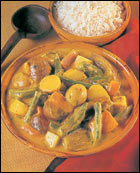


|
Egg curry Egg Kurma (Chettinad)  In every part of India a curry with hardboiled eggs is made by using the most common homestyle curry recipe of the region and adding hardboiled eggs when it is ready. It is served when unexpected guests arrive or to provide an acceptable protein curry for children. In some parts of India, however, particularly in the Malabar and Chettinad regions, an egg curry is actually considered an important part of the cuisine. This recipe (adapted) is from the home of Mr. M.A. Ramaswamy, who is the Raja of Chettinad, as shown to me by his wife, Sigapi Ramaswamy
In every part of India a curry with hardboiled eggs is made by using the most common homestyle curry recipe of the region and adding hardboiled eggs when it is ready. It is served when unexpected guests arrive or to provide an acceptable protein curry for children. In some parts of India, however, particularly in the Malabar and Chettinad regions, an egg curry is actually considered an important part of the cuisine. This recipe (adapted) is from the home of Mr. M.A. Ramaswamy, who is the Raja of Chettinad, as shown to me by his wife, Sigapi Ramaswamy
| ||
|
Ingredients Procedure Put the coconut into a blender with 2 cups warm water. Liquidize, then strain the coconut milk and set aside. Heat the oil in a cooking pot and fry the fenugreek seeds, fennel seeds and the cinnamon for 10 seconds. Add the onion and fry until lightly coloured. Add the spice paste and saute for 7 minutes. (It will darken in colour since it contains a lot of coriander). Add a few drops of water if it sticks to the bottom of the pot. Then add the tomatoes and saute for 2-3 minutes. Add 3 cups warm water with salt to taste, and simmer, covered, for 20 minutes, to make a smooth gravy. Just before serving, add 2 cups of the coconut milk and bring to the boil. Add the lime juice, add more salt if necessary, and gently lay in the hardboiled eggs with the yellow facing upwards. Carefully scoop into a serving dish.
Sindhi curry | Sindhi besan ka curry (Bombay)  This is a curry made from just a few teaspoons of gram flour (you can substitute wholewheat flour or atta). It is a famous dish of the Sindhi community and is usually eaten for Sunday lunch with boiled rice and fried potatoes called took. This curry is full of vegetables and lentils, thus an ideal dish to make for vegetarians guests, and the consistency is that of a thin dal.
It is also quite nice just as a soup �one can add a spoonful of boiled rice when serving it. It is considered heavy to digest, so is always eaten at lunchtime.
This is a curry made from just a few teaspoons of gram flour (you can substitute wholewheat flour or atta). It is a famous dish of the Sindhi community and is usually eaten for Sunday lunch with boiled rice and fried potatoes called took. This curry is full of vegetables and lentils, thus an ideal dish to make for vegetarians guests, and the consistency is that of a thin dal.
It is also quite nice just as a soup �one can add a spoonful of boiled rice when serving it. It is considered heavy to digest, so is always eaten at lunchtime.
| Ingredients Procedure Using a cooking pot of at least 2.8-litres capacity, heat 4 tbsps of the oil and add the fenugreek seeds followed by the cummin seeds. After 30 seconds add the ginger, chopped green chillies and curry leaves. Fry for a minute, then add the asafoetida, gram or wholewheat flour. Stir continuously for 4-5 minutes. The flour will absorb the oil and become like a paste. But it is stirring now which will give body to the taste. Turn the heat down and saute properly. Add the chilli and turmeric powders and another tbsp of oil and saute for 2-3 minutes. Then add 8 cups of hot water, stirring continuously until the paste dissolves in the water. Boil and simmer for 10 minutes. Add the vegetables (the yam first, followed 10 minutes later by the potatoes and 5 minutes later by the other vegetables), with salt, sugar, 4 whole green chillies, tamarind water, cocum and cocum water. Boil until the vegetables are cooked. Then add the mint and coriander leaves. The curry will thicken slightly on cooking. |

Home Page